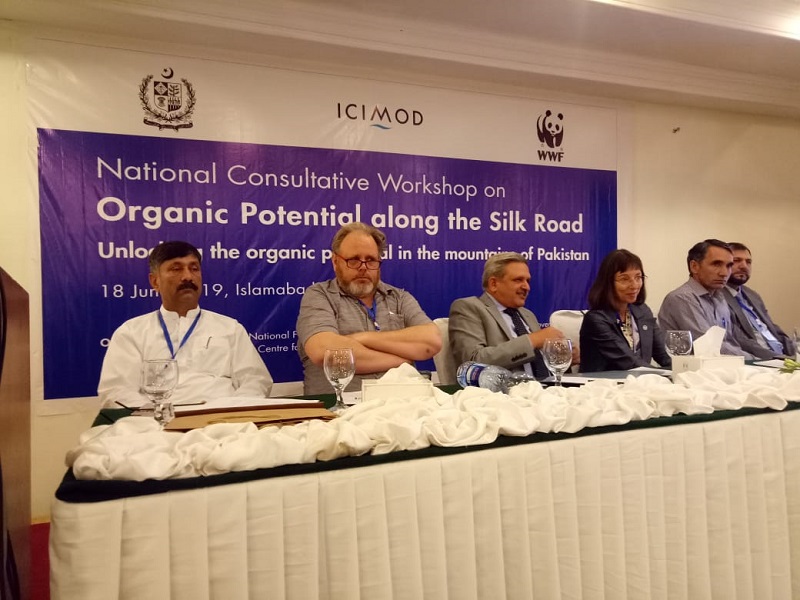ISLAMABAD, Pakistan: A national consultative workshop on “Organic Potential along the Silk Road” was held in Islamabad on June 18, 2019 under the auspices of the Ministry of National Food Security & Research in partnership with the International Centre for Integrated Mountain Development (ICIMOD) and the World Wide Fund for Nature (WWF).
The aimed to explore measures and alternatives for policy and strategic actions that will allow communities, governments, and the private sector to both protect the environment and thrive economically.
The key speakers of the workshop included: Farid Ahmad, Head Strategic Planning, Monitoring and Evaluation, ICIMOD; Rab Nawaz, Senior Director Programmes, WWF-Pakistan; and Asghar Mehmood, Director Agriculture, Government of Gilgit-Baltistan; Muhammad Azhar Ali, Chief Conservator of Khyber Pakhtunkhwa;, Muhammad Ayub Additional Secretary, Ministry of Food Security and Research; and Mina Dowlatchahi, Country Representative, Food and Agriculture Organization (FAO), Pakistan.
Rab Nawaz welcomed the guests, and emphasized the need to focus on capitalizing organic potential. He presented the analogy that that if Karachi is the economic hub of the country, then why not Gilgit-Baltistan as an ecological hub of Pakistan.
Farid Ahmad, Head Strategic Planning, Monitoring and Evaluation, ICIMOD stressed the need to understand the complexity of mountain system and its changing effects. He emphasized on the holistic, scientific and synergic ways to understand and maintain mountain systems. He gave the example of 10 major river basins of the HKH region which provide water and food to 240 million people as well as contributing globally. Additionally, three billion people in the world consume food from mountain ecosystems.
He stressed that unlocking organic potential in mountains of Pakistan is one of the concrete ways forward to sustain ecosystem and economic growth. He emphasized the synergy and value additions of organic agriculture in conjunction with trade and ecotourism will have a significant positive impact on mountain system and its people – bringing harmonious relation of people with ecology/nature. He further emphasized that Pakistan is being highly affected by climate change, and need to have a regional cooperation and strategies to mitigate adverse effect of climate change and to improve overall resilience.
Mina Dowlatchahi, Country Representative, FAO very much endorsed the workshop particularly the idea of unlocking organic potential. She stressed that it is important for the mountains of Pakistan Federally Administered Tribal Area (FATA) and Balochistan. She said that the strategy of the starting from Gilgit Baltistan and Chitral and scaling out the other mountain makes a very strong sense. She termed brining small family business as a good approach toward gender inclusion. She also explained few examples from Europe and FAO that how they have transitioned from the in organic to organic experience. She termed it as a timely approach to address low per capita income, unemployment and high migration rates.
Muhammad Ayub, Additional Secretary Ministry of National Food Security and Research spoke about the workshop as an opportunity in bringing agriculture, tourism and trade together as an integrated opportunity for sustainable economic growth in Pakistan which is in line with the vision of our Prime Minister. He committed to endorse the recommendation by the participants as one of the priority policy inputs.
Arif Makhdum and Atif Mughal presented the organic potential challenges and opportunities. Private sector participants and Chamber of commerce representative expressed workshop as a timely event to supplement to address the challenges to promote organic agriculture, trade and ecotourism.
Participants collectively felt the need to have pro-active role of the government to steer the direction particularly with organic pilots, certifying authority, legal and policy frameworks, private sector engagement, and improving quality standards.
Haider Raza, Regional Head Giglit-Baltistan, WWF-Pakistan in his closing remarks thanked all participants including Dr Muhammad Azeem, Member Planning Commission for Food Security and Climate Change for presenting recommendations in current initiatives of WWF-Pakistan and ICIMOD. He also thanked the participants for their proactive participation in the workshop.





